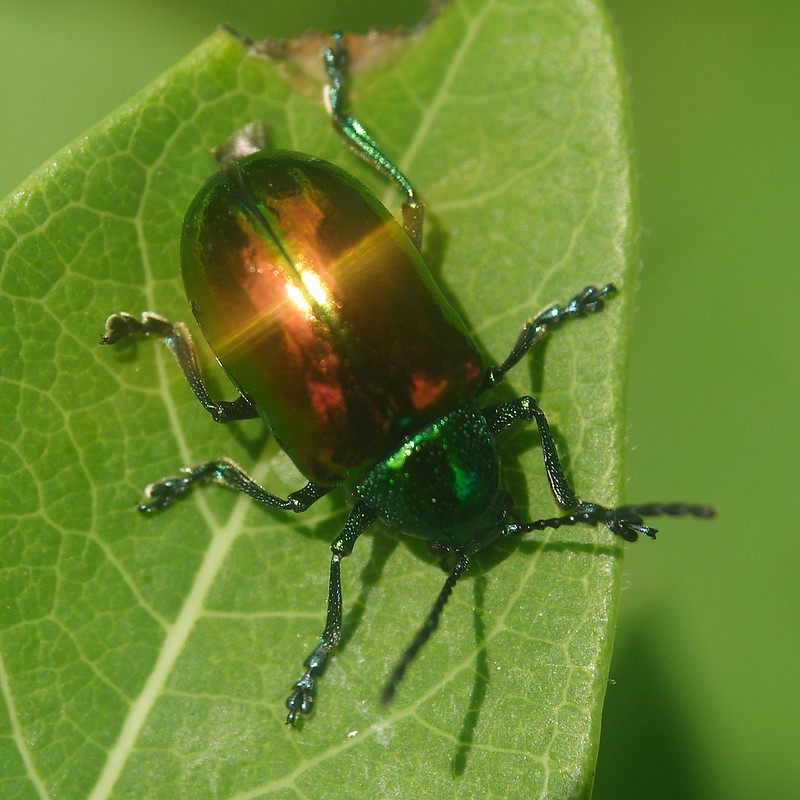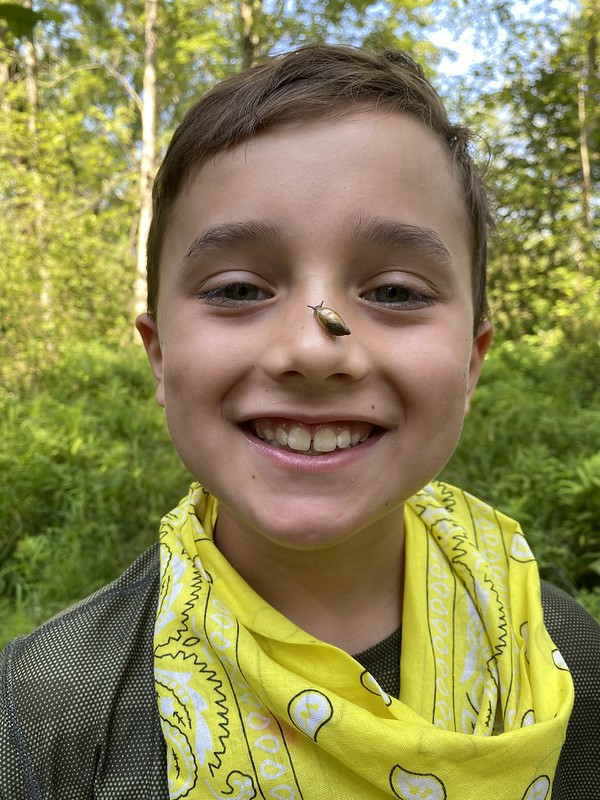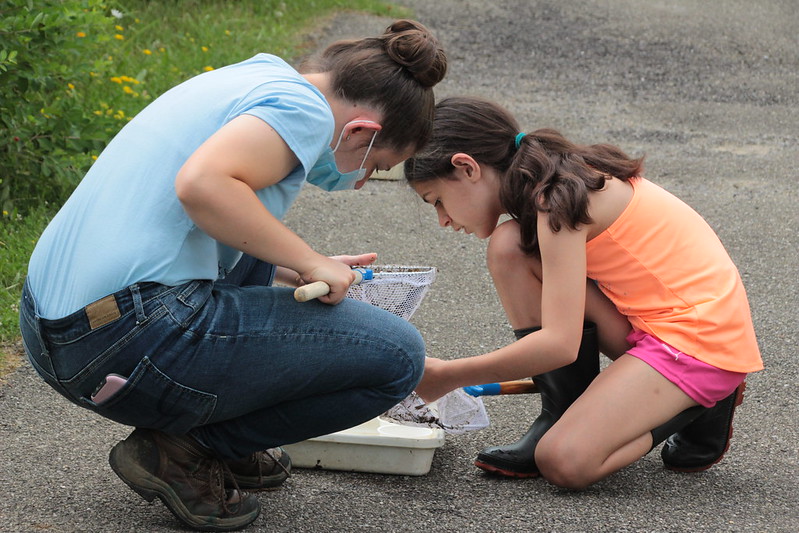At Audubon, we are moving forward in the midst of uncertainty. Using the New York State guidance for Day Camp, we’ve made modifications and opened for Summer Day Camp programming. We’ve had four weeks of campers exploring, playing, and learning outside. We do this because we are certain that positive outdoor experiences for kids are valuable. And can be done safely in our current climate.
Day Camp is tons of fun. But how do we know it is worth it? How do we measure success? Fun is certainly one measure. Attendance numbers and income are another. We need to pay the bills and replace and upgrade our facility and resources and grow. As a nonprofit, our success is more about achieving our mission than turning a profit. Here are a few ways we know Day Camp is successful.

On a hike, equipped with bug jars and magnifying glasses, a camper found a metallic colored beetle. Gently, she caught it. With pride and joy she shared it with others, declaring it “Japanese Beetle-ish”. After a comparison with a Japanese Beetle, in which all the differences were verbalized, it was declared “Not a Japanese Beetle”. That close observation led to naming it “Mustache” and was critical to identifying later with a field guide as a Dogbane Leaf Beetle.
Mustache accompanied us on the rest of our adventures, lovingly given grass, flowers, fresh air and much attention. Then was gently released at the end of the day. The following day, the camper returned, with her own bug catcher. In it was a ladybug she “rescued from the road” the previous night.
Another day, a camp group wondered what was beyond the skunk cabbage patch. So we put our best Poison Ivy spotters at the front of the group and set off. The campers helped each other over muddy spots and around briars. The swamp became alive with discoveries. What’s that?!? Look at this! Smell this! I can’t believe we are doing this! This is amazing! I’m muddy — what a good day!
I used to feel a sense of guilt and unimportance that I wasn’t doing work protecting critical habitats, caring for injured animals, or having rugged outdoor adventures. I used to want myself and my organization to do this important work. This serious work.
But I have come to learn that I am. We are. Outdoor places where children can explore and play is critical habitat. Children are animals. And in addition to food, water, and shelter, children also need a chance to explore the world with all their senses, witness the cycles of life, ask questions, experiment, pursue what they are curious about, help, play and grow as healthy human beings. And trust me, walking off-trail through skunk cabbage is a rugged adventure.
We do this work in part because we want it to have long-term impact on the way we as humans interact with the natural world. Research shows that the strongest predictor of a conservation ethic in adulthood is having had frequent, unstructured time in nature. We are helping to nurture future ecologists and planters of trees, potential wildlife biologists and rehabbers, and the next generation of explorers.
But we do not do this work alone. Even the most dedicated Audubon camper is only with us for a small percentage of the day, week, year. Much of their time in nature can happen outside of our programs. The second strongest predictor of a conservation ethic in adulthood is the presence of a caring adult to support that outdoor experience.
In a world where we are sticking closer to home and not everyone can and wants to come to programming, it is important to recognize that this exploration and play can also be done wherever you are. Here are a few things I’ve learned as I grow in the role of a caring adult who supports children’s outdoor experiences. May they be helpful to any other caring adult who wants to nurture young minds to love nature.

Sensory is everything. Especially for younger kids that’s how they learn. The world is concrete, not abstract. Thing are made meaningful when they are seen, touched, smelled, heard, tasted, manipulated, named.
What is ordinary for adults may be extraordinary for kids. A snail is never just a snail. It’s A SNAIL!!! It is a creature they discovered. One they can easily hold. One that reacts. It is another living thing that shares the world with us. One to be kind to. To create a “home” for in a jar. To name and then let go again.
Repeat. Repeat. Repeat. For kids, nature exploration and play is not a been-there-done-that experience. Campers arrive each day eagerly looking for the same frog in the same small pond. New experiences can be encouraged. But a familiarity and deeper understanding only comes from doing the same thing over and over again.
Nature is not always pretty, clean, or nice. Many kids are drawn to mud like a magnet. What a sensory experience! Dirt is the price of admission. There are things outside that can hurt, make us messy, and make us sad. But that is life. Part of growing into a healthy person is learning how to cope with those things and moving forward despite them. And with a caring adult as a guide, those hard things are easier to deal with.
Backyard nature is better. While we as adults may value high peaks and exotic destinations, kids may find the backyard, the local park, or slightly wild space exciting. The best part about those places is, for the most part, nothing is precious. Unlike other more protected places with rare species or fragile ecosystems, most backyard nature can be touched, collected, and picked to take home to mom.
It’s OK to say I don’t know. Kids ask a million questions. It is impossible to answer all of them. Asking questions is a valuable skill to develop. But when you don’t know the answer be honest. Other options are “How does it feel/smell/sound/look?” or “I don’t know but let’s look it up.” You might learn something too.
Here’s the most important. Just show up. To be a caring adult who nurtures a child’s love of nature you just need to show up. Rachel Carson wrote, “If a child is to keep alive his inborn sense of wonder, he needs the companionship of at least one adult who can share it, rediscovering with him the joy, excitement, and mystery of the world we live in.”
Katie Finch is a nature educator at Audubon.
Audubon Community Nature Center builds and nurtures connections between people and nature. ACNC is located just east of Route 62 between Warren and Jamestown. The trails are still open from dawn to dusk as is Liberty, the Bald Eagle. Though the Nature Center is currently closed, including restrooms, due to COVID-19 restrictions, drive-thru sales are available from the Blue Heron Gift Shop and Day Camps are open. More information can be found online at auduboncnc.org or by calling (716) 569-2345.


Recent Comments